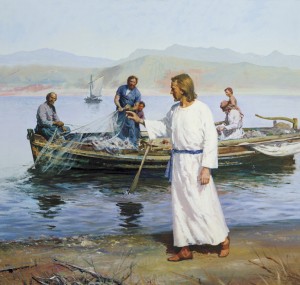By Eric D. Huntsman. From Miracles of Jesus, 25–29, and cross-posted at http://huntsmannewtestament.blogspot.com/
The nature miracles in the gospels not only emphasize that Jesus was in fact the Creator, they also underscore that he was the one who sustained and nurtured his creation. In the Hebrew Bible, God is described as providing for both man and beast, giving them plants and fruit for food (Genesis 1:29–30). Similarly, in his own Sermon on the Mount, Jesus reaffirmed that Heavenly Father fed fowls of the air (Matthew 6:25–26). Psalm 104 taught that YHWH provides for the needs of all creation, poetically proclaiming that “He sendeth the springs into the valleys, which run among the hills. They give drink to every beast of the field: the wild asses quench their thirst. . . . He causeth the grass to grow for the cattle, and herb for the service of man: that he may bring forth food out of the earth; And wine that maketh glad the heart of man, and oil to make his face to shine, and bread which strengtheneth man’s heart. . . .These wait all upon thee; that thou mayest give them their meat in due season. That thou givest them they gather: thou openest thine hand, they are filled with good” (Psalm 104:10–11, 14–15, 27–28, emphases added). These references to Jehovah’s being the source of wine and bread thus serve as models for Jesus’ miracles of providing wine and bread during his ministry. Such miracles of provision are often called “gift miracles,” and two factors distinguish them from most of Jesus’ other miracles. First, while there is an apparent need in each instance, there is no direct request for aid or help, reflecting that the Lord knows that our “heavenly Father knoweth that ye have need of all these things” (Matthew 6:32). Second, the way in which the miracle is actually accomplished is not clearly described, perhaps symbolizing that God’s efforts in providing for us often go unrecognized.[1]
The first recorded miracle of provision after the miracle at Cana is the astonishing catch of fish at Capernaum that accompanied the call of Simon Peter in Luke 5:1–11. Kfar Naḥûm, or “Nahum’s village,” is not attested in the Old Testament, but this Hasmonean fishing village had become a prosperous town by the first century A.D. and was part of the tetrarchy of Herod Antipas during Jesus’ ministry. Near the border of the territory of Antipas’ brother Philip, it had attracted fisherman from nearby Bethsaida, such as Simon Peter and Andrew. Capernaum also became the headquarters for much of Jesus’ Galilean Ministry, so much so that it came to be known as Jesus’ “home town” (see Mark 2:1; Matthew 4:13; 9:1) and witnessed more recorded miracles than any other site.[2] 
In this story, Jesus entered into the boat of Simon, who had been fishing all night without catching anything. After Jesus instructed Simon to lower his nets one more time, Simon immediately caught so many fish that his nets began to break. Peter reacted in fear and awe, as did his partners James and John, but when Jesus called upon them to become fishers of men, they forsook everything and followed him. Inasmuch as Peter was a fisherman by trade, Jesus’ helping him obtain such a great catch certainly demonstrates that he can help and support each of us in our chosen vocations. However, because Peter left his boat and nets, this miracle clearly served a different purpose in the Lucan narrative. Instead the miracle serves as a sign that strengthened Simon’s faith so that he could accept his commission and follow Jesus.[3] As becomes more obvious from a similar story in John that is set after Jesus’ resurrection (John 21:4–14; see discussion below), the very image of catching fish was an important symbol of Peter’s apostolic role in gathering disciples to Christ. Still, the very real fact that Jesus could provide actual fish, which could be used for food or for sale, underscores that he can provide for his own while they are in his service.

